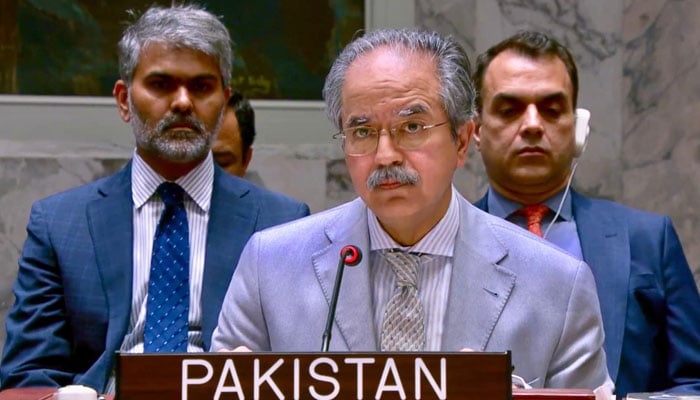At UNSC meet on Iran-Israel war, Pakistan says unilateral military actions only deepen conflicts
"We must act now to prevent the situation from spiralling further out of control," says Pakistan's envoy to UN
June 23, 2025

- Pakistan stresses dialogue, diplomacy as viable path forward.
- Warns that further escalation risks catastrophic consequences.
- Islamabad joins China, Russia in draft resolution urging ceasefire.
NEW YORK: Amid ongoing tensions in the Middle East involving Iran and Israel, only to be exacerbated by US strikes on Tehran's nuclear sites, Pakistan has told the United Nations Security Council (UNSC) that history reflects that the use of force and unilateral military actions only deepen conflicts and entrench divisions.
"We must act now to prevent the situation from spiralling further out of control [....] Dialogue and diplomacy remain the only viable path forward," Pakistan's Permanent Representative to the UN Asim Iftikhar told the UNSC huddle amid increasingly volatile situation in the region.
The remarks came during a key UNSC meeting after the US struck Iran's Fordow, Natanz, and Isfahan nuclear sites which President Trump termed "spectacular success" in preventing Tehran from allegedly developing nuclear weapons — a claim vehemently denied by Tehran.
Since the attack on its nuclear facilities, the Iranian parliament has backed the move to block the Strait of Hormuz — the world's key trade passageway.
Iran has slammed the US for sabotaging ongoing diplomatic efforts with its strikes while urging the international community to take a clear stance, saying "global norms and diplomacy are under direct threat".
"We were in the middle of negotiations," FM Araghchi said. "It was not Iran that walked away. The US abandoned diplomacy with missiles, not words," Iranian Foreign Minister Abbas Araghchi said during a press conference during the Organisation of Islamic Cooperation (OIC) summit in Istanbul on Sunday.
"They crossed a very big red line by attacking [Iran’s] nuclear facilities," the FM added.
Speaking at the UNSC, Ambassador Iftikhar echoed the earlier statement issued by the Foreign Office condemning US bombings and backing Iran's right of self-defence and lamented the attacks on the nuclear sites as "dangerous precedent and pose a grave threat to the safety and security of populations across the region and the world".
Denouncing the attacks on IAEA-safeguarded facilities, the envoy said that Islamabad has joined China and Russia in circulating a draft resolution calling for an "immediate and unconditional ceasefire".
The resolution also urges "all parties to refrain from further escalation; demands the urgent protection of civilians and civilian infrastructure; and supports a diplomatic path forward on the Iranian nuclear issue that is acceptable to all parties".
Reiterating Pakistan's support for Iran, the UN representative underscored that the sharp rise in tensions and violence as a result of the Israeli aggression and unlawful actions was profoundly disturbing and "any further escalation risks catastrophic consequences for the region and beyond".
Furthermore, the diplomat urged the UNSC to reaffirm its obligation to protect civilian lives and property on both sides.
"All parties must adhere fully to international law, particularly international humanitarian law," he said while stressing the UN body to "promote urgent recourse to dialogue and diplomacy, consistent with the purposes and principles of the UN Charter" and to find a peaceful and lasting resolution to the Iranian nuclear issue.
Pakistan's backing of Iran comes a day after Prime Minister Shehbaz Sharif spoke to Iranian President Masoud Pezeshkian on phone and backed the latter's right to self-defence.
The premier conveyed Pakistan's condemnation of the US attacks, which followed Israel's unprovoked and unjustified aggression over the past eight days.
He reaffirmed Islamabad's unwavering solidarity with the brotherly people and the Iranian government, while expressing heartfelt condolences on the loss of precious lives and prayed for the swift recovery of the injured.
Meanwhile, President Pezeshkian conveyed his deep appreciation for Pakistan's support to Iran. He thanked PM Shehbaz, the government and the people of Pakistan, including the military leadership, for standing in solidarity with the Iranian people and its government.
The two leaders emphasised the need and urgency of forging unity among the Ummah at this critical juncture. They also agreed to remain in close contact.











